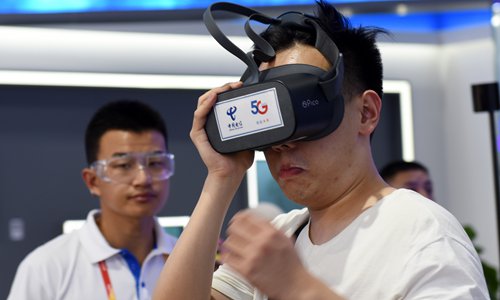HOME >> BUSINESS
ICs will become key strategic sector for nation
Source:Global Times Published: 2019/6/11 20:43:40
Commercial 5G services to provide large boost to industry

A tourist tries 5G data equipment at an experience hall during the international horticultural exhibition held in Beijing on Sunday. China's telecom industry regulator officially released the first 5G business licenses to China Mobile, China Union, China Telecom and China Broadcast Network on Thursday, helping the country enter the fast lane in commercializing the next generation of wireless technologies. Photo: IC
With the coming 5G era, the semiconductor industry will not only become larger, but also more strategic as 5G enables more innovative applications, giving China a firmer foothold in the technology race, experts said Tuesday.
China's market for semiconductor materials and integrated circuit products has been on the rise. According to a report released by Beijing-based research firm CCID Think Tank in March, semiconductor sales in the Chinese mainland market last year reached $158.4 billion, rising 20 percent over the previous year.
Xiang Ligang, director-general of the Beijing-based Information Consumption Alliance, said that behind the rise of the integrated circuit business in recent years has been the booming information communications technology (ICT) industry, and with the arrival of commercial 5G, the market will become even larger and more important as the technology will enable more innovative application of integrated circuits.
"5G will bring about an unprecedented era for semiconductors," Xiang observes. "5G phones, for example, will create huge demand for semiconductors and integrated circuit products. Besides, many innovative new applications, including smart households, will also further enlarge the semiconductor market in China."
Semiconductors are the raw materials used to make ICs. Semiconductor device fabrication is the process used to create ICs, which are present in everyday electrical and electronic devices. However, the semiconductor business in China is still dependent on imports, as the domestic design and manufacturing of integrated circuits remain to be developed. In 2017, the Chinese mainland became the biggest importer of integrated circuits in the world, totaling $294.6 billion. In comparison, the export volume of ICs was $93.6 billion, according to the report.
China's heavy reliance on IC imports is the result of the global division of the high-technology sector, under which Chinese manufacturers only develop chips based on frameworks licensed from foreign companies, said Fu Liang, a Beijing-based telecom industry analyst.
"Some semiconductor makers in China have the capacity to produce chips. But in the past, domestic companies preferred imported IC products over domestic ones, which resulted in lackluster market demand. The imbalance between input and output forced many Chinese suppliers to abandon plans to make their own chips," an industry insider, who spoke on condition of anonymity, told the Global Times.
The insider noted that the situation had begun to reverse after the Huawei and ZTE incidents, with some smartphone makers actively working with chip developers to accelerate the research of domestic chips.
However, with China's early commercialization of 5G technology, the nation could revolutionize its IC industry ahead of other countries, as terminal devices under 5G network require next-generation 7-nanometer chips to have a high level of algorithm ability. They need to compute faster while consuming less power, industry insiders noted.
"This is a strategic opportunity for China to gain a firm foothold in the global technology race. If we lead the chip research in the 5G era, we're moving from a passive position to an active position and would have a much larger say on the global stage," Fu noted.
Posted in: INDUSTRIES